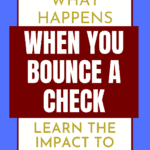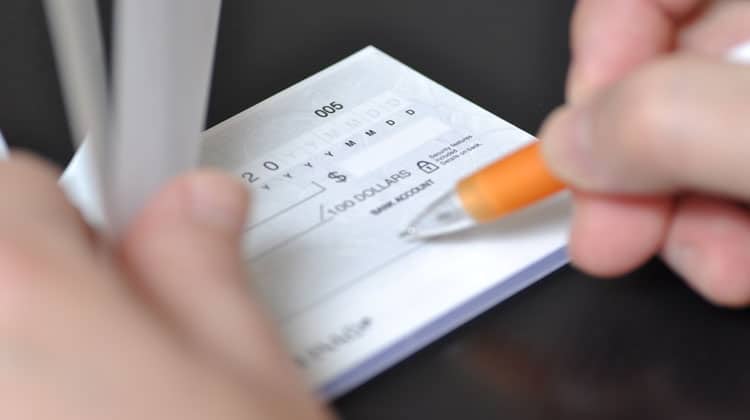THIS POST MAY CONTAIN AFFILIATE LINKS. PLEASE SEE MY DISCLOSURES. FOR MORE INFORMATION.
Do you know what happens if you bounce a check?
While not ideal, most people will bounce a check at some point in their life.
Unexpected bills, a late deposit, or other circumstance will lead to you not having enough money in your checking account to cover a check you wrote.
But what happens to you and the check if it does bounce?
In this post will cover all the consequences that result in writing a check on an account that doesn’t have the funds to pay it.
Table of Contents
What Happens If You Bounce A Check?
What Is A Bounced Check?
A bounced check is the term used to describe a check that is unable to be processed because the amount of the check is more than there is money in the bank account of the check writer.
Bouncing is used to describe the action of the check returning to the original bank.
Put simply, if you write a check and you don’t have the money in your checking account available for that transaction, you wrote a check that will inevitably bounce its way back to your bank.
Consequences Of Bouncing A Check
So, what happens if you bounce a check?
Unfortunately, while the consequences may not be severe, they can still be problematic for those who are already dealing with financial issues.
There are numerous things that will happen when you bounce a check.
Overdraft Charges
If you have overdraft protection on your checking account, your bank will allow you to go over the total balance that you have stored away.
- Read now: Learn more about overdraft protection
However, this means that you have to pay a fee for allowing them to clear the check amount and going into a negative balance on your account.
The average overdraft fee is around $35, which is only the beginning of the financial repercussions that occur when a check bounces.
Non-Sufficient Fund Fees (NSF)
In the event that you don’t have overdraft protection, the check will be sent over to the depositor’s bank.
Because of the inconvenience that the bounced check has caused, you will be charged a fee for nonsufficient funds or NSF charge, which can typically run around the same amount as an overdraft fee.
Some banks may charge additional fees, like a returned check charge after this initial fee as well.
Merchant Fees
For those who lost out on profits for a product or service due to a bounced check, they have the right to charge you for the faulty check.
State law varies, but in many states, they can charge you merchant fees of anywhere around $30 to $40.
In some instances, legal action may be pursued in order to collect the money that you owe, which can result in further fines and costs for defending yourself in a court of law.
It’s important to consider who the recipient of your check was as well.
For example, if you wrote a check to your landlord, it may be within their rights to evict you due to insufficient funds in your bank account.
Credit Report And Other Issues
Beyond the many fees that may be incurred when a check bounces, you should also consider your credit and your financial standing.
If you send a bad check to a company or entity that reports payments to a credit bureau, your credit score may take a hit.
What you should be worried about most, however, is being written up.
The Telecheck and ChexSystems report are databases that keep records of this type of activity.
If you end up being flagged, you may not be able to write checks, open up a new checking account with another bank or financial institution, or even maintain your current checking account.
Put simply, you want to make sure you know exactly how much money you have in your account so that you don’t have to learn what happens if you bounce a check.
What You Should Do When A Check Bounces
A bounced check isn’t always the result of someone knowingly sending out bad checks.
Sometimes, people may think that they have more money in their account than they actually do.
This is especially true if someone has direct deposit or recurring payments that may have cost them more one month than in previous months.
The good news? There are things that can be done about it.
Now that we know what happens if you bounce a check, it’s important to go over some things you can do to remedy the situation or prevent it from happening in the future.
Take Necessary Preventative Steps To Avoid Bounced Checks
Bounced checks don’t have to happen if you take all the right steps to prevent your account from going into the red.
Setting low balance alerts on your bank account and using budgeting apps to stay on top of your transactions will make it so that you always know how much money you have to spend.
- Read now: Click here to learn how to start budgeting
- Read now: Find out why so many people love Tiller Money
Additionally, make sure you record all checks you have written in your check register so you limit the risk of overdrawing your account.
This includes making note of electronic checks as well so you know your available balance.
You should also aim to have plenty of cushion in your account as a safety net so that if you do end up going over on certain emergency expenses, you don’t have to deal with the surprise that comes with discovering your check wasn’t cleared.
Finally, you should only use checks when absolutely necessary.
Otherwise, use your debit card to avoid spending money that you don’t have at your disposal.
However know that the even if you use your debit card, you can still fall victim to overdraft fees, so you still need to monitor your checking account balance.
The good news is there won’t be additional fees you will be charged in this situation.
Communicate The Mistake To Your Bank And The Recipient
Reaching out to both your bank as well as the recipient of your check to communicate the mistake and come to an understanding is the best way to deal with the situation.
Under no circumstances do you want it to get to the point where civil litigation is considered their best option.
The sooner you rectify the situation, the better.
Also, by talking to your bank, you might be able to get some of the fees waived.
This is especially true if you are a loyal customer who never overdraws your account or bounces a check.
Pay Off Fees And Deposit Funds To Avoid A Bounced Check
If you know that your check is going to bounce, taking action and depositing funds into your bank account before it has the opportunity to become an issue will help you avoid the check fees and other repercussions listed above.
In many cases, it will take a day or so for the check to clear.
So if you notice the mistake early enough, you have time to deposit enough funds into your account or transfer money from your savings account.
If your check does bounce and you do face an overdraft fee, NSF fee, and merchant fees, make sure to take care of these as soon as possible.
Also, speak with the merchant or recipient to learn what other actions you may need to take in order to remedy the situation.
This is especially important if the recipient was an organization or entity that you rely on for housing or other crucial needs.
As it is with any other debt that you face, clearing it as soon as you can is the best way to avoid any civil court or criminal charges that may arise as time goes on.
Is It A Crime To Bounce A Check?
For the majority of people, it is not a crime to bounce a check and you will not face jail time.
This is because most times, it is an honest mistake where you write a check and when it gets presented to the bank to be cashed, your checking account doesn’t have the funds to pay it.
However, if you intentionally write checks on accounts that you know have non-sufficient funds, this is a crime.
Depending on the severity of your scheme, the legal trouble you face could be either a felony or a misdemeanor.
The most well known form of check fraud is check kiting.
This is when you take advantage of the float time between writing paper checks and when they clear.
For example, you write a check for $1,000 on a checking account that only has $500 in it.
You take the bad check and cash it at another bank.
This other bank makes the funds available before the check clears, so you withdraw the $1,000.
You then deposit $500 into the original account so that the check you wrote does not bounce.
The process is then repeated over and over again.
In some instances, people who write bad checks write them to retail locations, like a grocery store, to make it more difficult to catch as opposed to writing checks between accounts they own.
Can A Cashier’s Check Bounce?
The only way for a cashier’s check to bounce is if it is a fake check.
A genuine cashier’s check is drawn on the bank’s own funds and not someone’s personal account.
It is signed by a bank teller or cashier.
The reason these checks do not bounce is because before the bank writes the check, they withdraw the money from the persons account, ensuring they have the money to cover the check.
The check itself it drawn on the bank’s account, so when you cash it, you know the money is available and the check will clear.
Final Thoughts
Knowing what happens when you bounce a check is something you need to know because most everyone will experience this situation at some point in their life.
The good news is that if you bounce a personal check once and a while, it doesn’t do much damage to your finances.
At most you pay fees and have to deal with the headaches of correcting the issue.
But if bouncing checks happens frequently, you need to take the steps to improve your finances and keep more money in your checking account so you can avoid doing it.
- Read now: Learn how to get back on your feet financially
- Read now: Find out how to grow your own money tree
- Read now: Here’s the financial avoid you need to make sure you avoid
I have over 15 years experience in the financial services industry and 20 years investing in the stock market. I have both my undergrad and graduate degrees in Finance, and am FINRA Series 65 licensed and have a Certificate in Financial Planning.
Visit my About Me page to learn more about me and why I am your trusted personal finance expert.


